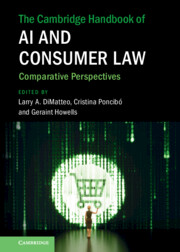Book contents
- The Cambridge Handbook of AI and Consumer Law
- The Cambridge Handbook of AI and Consumer Law
- Copyright page
- Contents
- Detailed Contents
- Contributors
- Preface
- Statement
- Part I Rise of AI Consumer Markets
- Part II Consumer Choice
- 5 AI and Existing EU Consumer Law
- 6 Using AI to Influence Consumer Choice
- 7 Consumers and Digital Delegates
- Part III Liability
- Part IV Harm
- Part V Application and Regulation of AI
5 - AI and Existing EU Consumer Law
from Part II - Consumer Choice
Published online by Cambridge University Press: 21 October 2024
- The Cambridge Handbook of AI and Consumer Law
- The Cambridge Handbook of AI and Consumer Law
- Copyright page
- Contents
- Detailed Contents
- Contributors
- Preface
- Statement
- Part I Rise of AI Consumer Markets
- Part II Consumer Choice
- 5 AI and Existing EU Consumer Law
- 6 Using AI to Influence Consumer Choice
- 7 Consumers and Digital Delegates
- Part III Liability
- Part IV Harm
- Part V Application and Regulation of AI
Summary
This chapter examines diverse aspects of new technologies that are disrupting traditional consumer protection. These include phenomena such as consumer profiling or commercialization of data. It can be concluded that artificial intelligence represents a particular challenge for consumer law and policy. Consumer law should be technologically neutral. Irrespective of the technology deployed, the level of consumer protection needs to be always maintained. However, consumer law requirements must never be seen as obstacles to the innovation and the development of new technologies; and establishing the right balance between these two values remains a particular challenge.
Keywords
- Type
- Chapter
- Information
- The Cambridge Handbook of AI and Consumer LawComparative Perspectives, pp. 49 - 61Publisher: Cambridge University PressPrint publication year: 2024

